Key takeaways:
- Understanding safe BBQ practices is essential to prevent cross-contamination and ensure food safety, including the importance of using separate utensils for raw and cooked foods.
- Maintaining proper cooking temperatures with a meat thermometer is crucial to avoid foodborne illnesses.
- Investing in quality BBQ equipment and safety measures, such as a heat-resistant apron and proper utensils, enhances the grilling experience and reduces the risk of accidents.
- Regularly cleaning the grill and surrounding areas, as well as practicing good food handling techniques, ensures a safe and enjoyable BBQ environment.
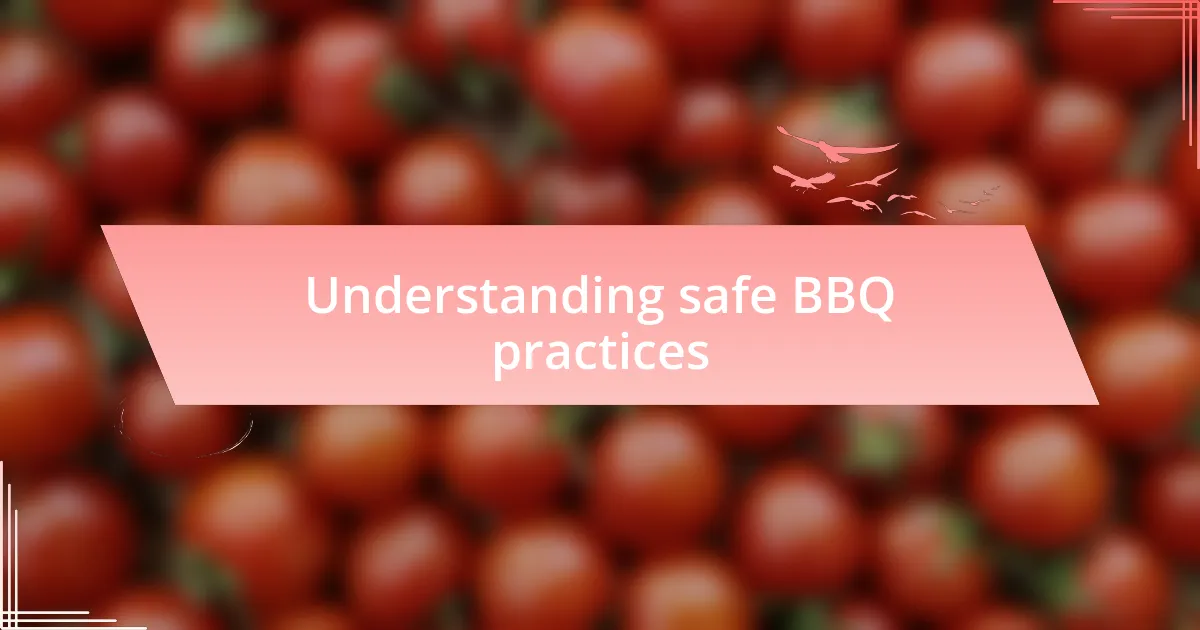
Understanding safe BBQ practices
When I first started hosting BBQs, I quickly learned the importance of understanding safe practices. One pivotal moment was when I learned how contaminated surfaces could spoil an entire gathering. I remember watching a friend unknowingly place raw meat next to veggies; it struck me how easily cross-contamination can happen, reminding me that maintaining a clean environment is essential for a successful BBQ.
Proper cooking temperatures also hold a personal significance for me. I recall the nervous excitement of flipping burgers, only to discover that they were undercooked. It was a lesson learned the hard way, reinforcing the fact that using a meat thermometer is non-negotiable. This simple tool can be a game changer, ensuring food is not only delicious but also safe to eat.
I often wonder how a few basic precautions can drastically improve our BBQ experiences. For me, establishing designated areas for raw and cooked foods has transformed my cooking style. It not only mitigates risk but also keeps my mind at ease, allowing me to truly enjoy the company of friends and family without worry.
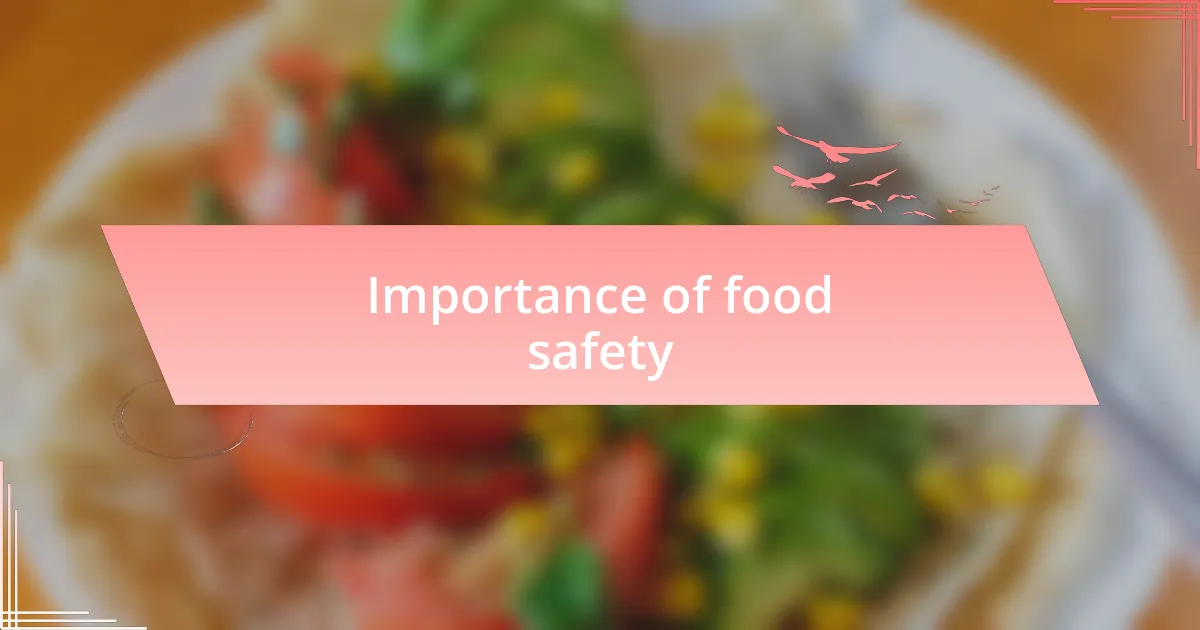
Importance of food safety
Food safety is crucial in any culinary setting, especially during BBQs where the potential for foodborne illnesses lurks. I vividly remember a summer afternoon when a casual backyard gathering turned sour due to spoiled condiments left out for too long. It made me realize that ensuring food stays at the right temperature is more than just a guideline; it’s about protecting the health of everyone we care about.
I often reflect on how my approach to food safety has evolved over time. I once overlooked the importance of washing my hands, thinking it was unnecessary. After a close call with a food poisoning scare at a friend’s house, I understood that a few seconds spent cleaning can prevent serious consequences. It’s a simple act, yet it truly embodies respect for our bodies and those we cook for.
When I think about food safety, I can’t help but wonder why it’s often brushed aside in the excitement of grilling meat. Have you ever considered what could happen when safe practices are ignored? Those moments of oversight can lead to unpleasant results, reminding us that prioritizing safe food handling is a sign not only of good cooking but also of genuine care for our guests.
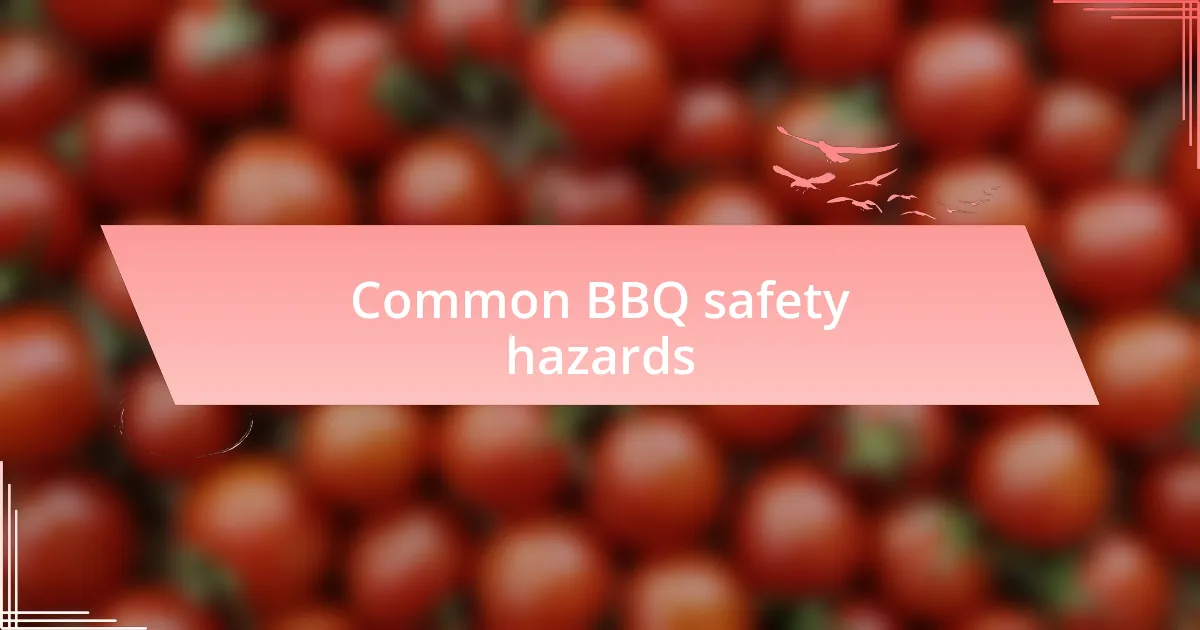
Common BBQ safety hazards
When I think about BBQ safety hazards, one major concern that comes to mind is the risk of cross-contamination. I once hosted a barbecue where raw chicken was placed near the fresh vegetables. In a moment of distraction, I realized I hadn’t used separate cutting boards, and it struck me how easily harmful bacteria could spread. It’s a stark reminder that being mindful of food separation is not just a rule—it’s critical for keeping our loved ones safe.
Another pervasive hazard is undercooked meat, which can lead to foodborne illnesses that linger long after the grill has cooled. I recall a time when I took my steaks off the grill a bit too soon, confident in my cooking skills. After a later mishap involving upset stomachs, I learned that using a meat thermometer is essential, as it provides assurance that food has reached a safe internal temperature. Nobody wants to ruin a summer gathering with a bout of food poisoning.
Lastly, I believe we can’t overlook the dangers of outdoor grilling accidents, such as flare-ups or grease fires. I once experienced a small fire when drippings from my burgers ignited unexpectedly. The thrill of grilling quickly turned into a panic-inducing moment that taught me the importance of keeping a fire extinguisher nearby and being cautious with my grilling setup. Have you thought about your own grilling safety measures? Ensuring a safe environment can significantly reduce the risk of accidents and make the cooking experience enjoyable.
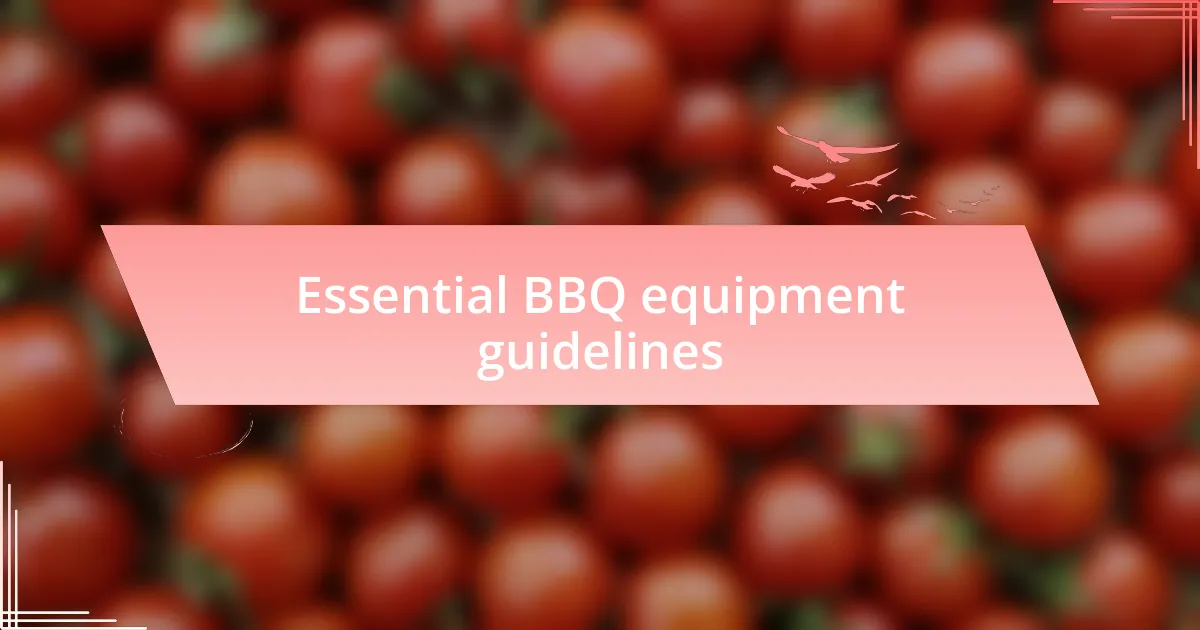
Essential BBQ equipment guidelines
When it comes to essential BBQ equipment, I’ve learned that the right tools can make all the difference. A good quality grill is a must, and I prefer gas grills for their convenience, especially during those unexpected downpours. I remember a rainy day barbecue where a few friends and I battled the elements; having that reliable gas grill saved the day and let us enjoy our burgers without worrying about endless charcoal lighting.
I can’t stress enough the importance of investing in proper utensils. A long-handled spatula and tongs are game-changers; they protect your hands from the heat while ensuring precision when flipping meats. One memorable afternoon, I fumbled with a regular fork, only to realize too late that I had a close call with the flames. Ever since, I’ve made it a point to keep my BBQ tools handy and well-maintained.
Lastly, consider your safety gear. I always have a heat-resistant apron on hand, especially when I know I’ll be grilling for a crowd. It not only protects my clothes but also adds a layer of confidence. Have you thought about how often we underestimate these seemingly simple precautions? Investing in the right BBQ equipment can transform your grilling experience from good to unforgettable.
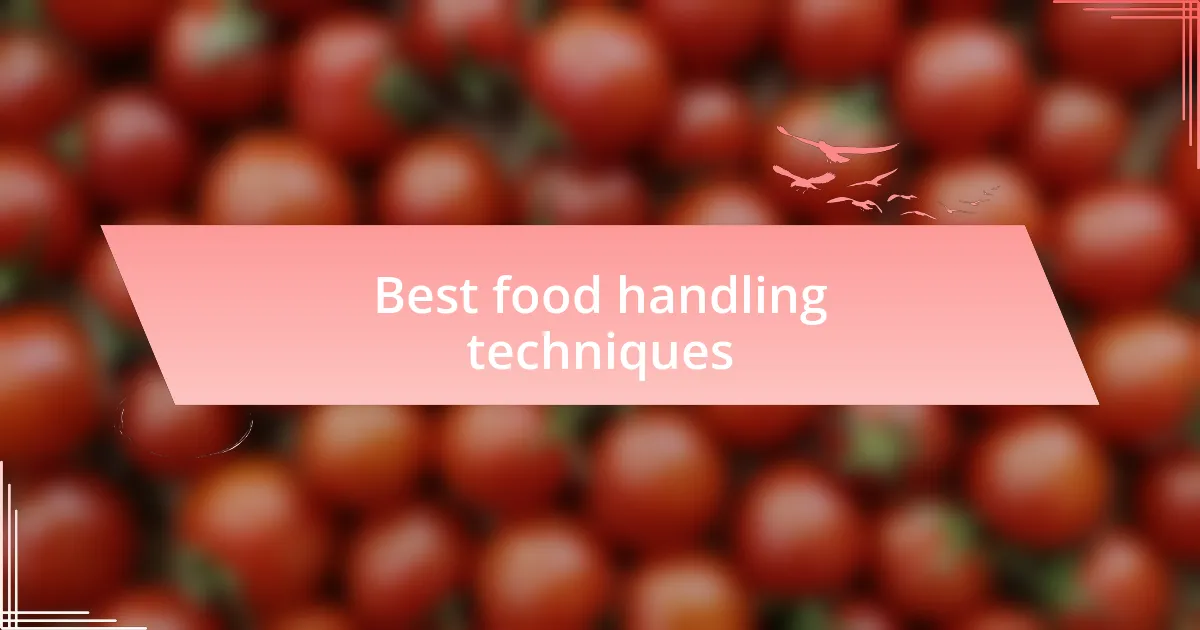
Best food handling techniques
When it comes to food handling techniques, I always prioritize cleanliness. Keeping your hands, utensils, and surfaces sanitized can drastically reduce the risk of foodborne illnesses. I remember a barbecue where I was so eager to get grilling that I skipped washing my hands after handling raw meat. That experience taught me the hard way just how crucial it is to keep everything clean, from hand washing to using separate cutting boards for meat and veggies.
Another key technique is to properly store your ingredients. I like to ensure my meats are at the right temperature before cooking; this often means placing them in the refrigerator as soon as I get home from the market. Just last week, I forgot to put a few chicken breasts in the fridge right away. By the time I remembered, I realized I could have put everyone at risk if I didn’t toss them. Remember, keeping perishable items chilled is vital to maintaining their freshness and safety.
Finally, I can’t stress enough the importance of cooking food to the right temperatures. Using a meat thermometer has become my best friend in the kitchen. I recall an uneasy moment when I confidently cut into a steak, only to find it was still rare in the middle—definitely not ideal for a barbecue! Now, I check temperatures diligently to ensure that my food is not just delicious but also safe for everyone to enjoy. What’s your technique for ensuring everything is cooked just right?
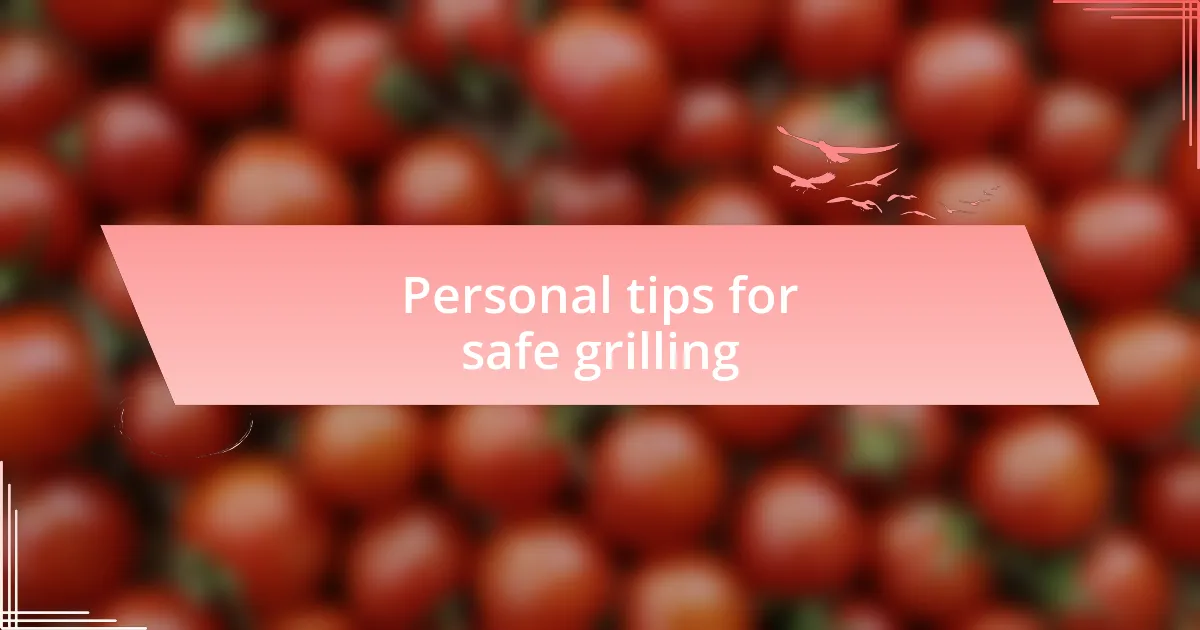
Personal tips for safe grilling
When it comes to grilling, I always make sure to keep a close eye on flare-ups. The first time I felt the heat of those flames licking the grill, I panicked and almost dropped my burger. Now, I know to keep a spray bottle filled with water nearby to quickly douse any unexpected fires. Have you ever had a similar incident? Knowing how to manage those sudden bursts of flame can be the difference between a cooked meal and a kitchen disaster.
Another tip I’ve learned over the years is to keep raw and cooked foods separate. I remember once when I placed my juicy, freshly grilled chicken on the same platter that had held the raw meat, and I immediately felt that knot of anxiety in my stomach. It’s so easy to make mistakes in the heat of the moment. Now, I always use designated platters and utensils for raw ingredients and cooked food, which not only boosts safety but also makes cleaning up much easier.
Lastly, I absolutely recommend marinating meats in the fridge rather than on the counter. I used to think it didn’t matter, but after accidentally letting a pork loin sit out in the kitchen for a few hours, I realized how harmful it could be. Marinating in the fridge not only enhances flavor but also ensures the meat remains at safe temperatures. Have you ever stopped to think about how simple adjustments can elevate your grilling game? It’s these little changes that truly make a difference for everyone’s health and enjoyment.
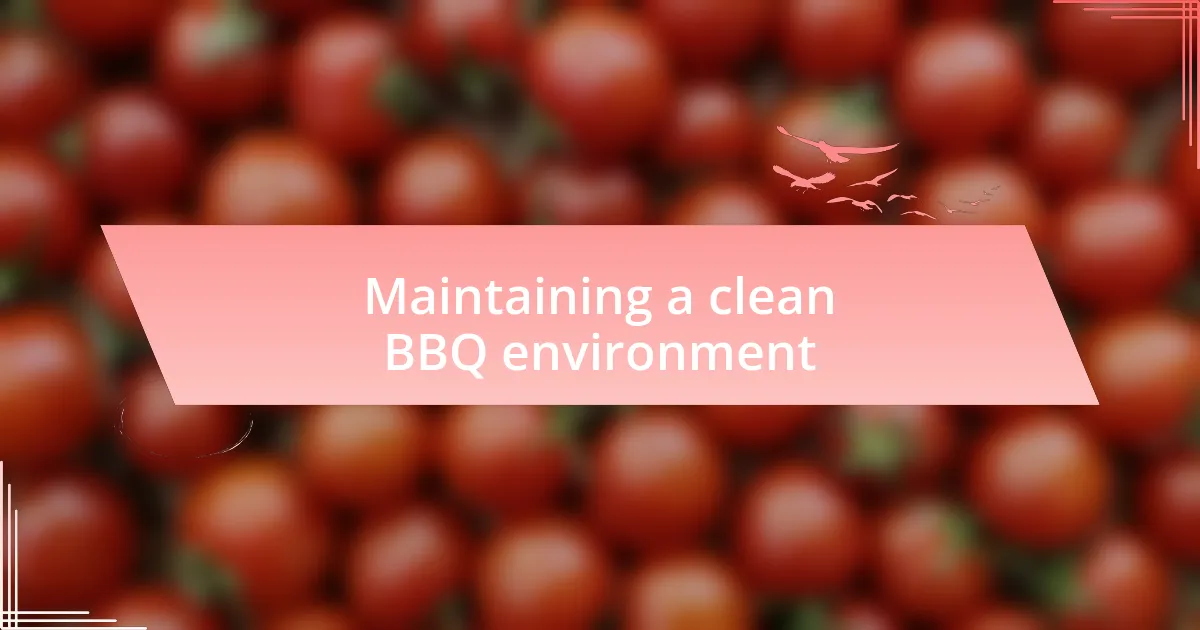
Maintaining a clean BBQ environment
When I fire up the grill, the first thing I do is give the cooking surface a good scrub. I still remember the time I didn’t clean it properly and ended up with burnt-on remnants that tainted my steaks. It made me realize how much a clean grill can influence not just the flavor but also overall food safety. Do you want those flavors from last week’s barbecue seeping into your fresh burgers?
Beyond the grill itself, I pay special attention to the surrounding area. A cluttered workspace can lead to accidents; I once tripped over a stack of plates while trying to juggle burgers and tongs. Now, I make a habit of keeping all my grilling tools organized. This simple practice not only keeps me safe but also creates a more enjoyable atmosphere for everyone enjoying the BBQ.
Cleaning utensils and tools right after use is another critical step I’ve picked up along the way. I can’t count how many times I took a break, only to return and find food residue glued onto my brushes and spatulas. By keeping a bucket of soapy water nearby, I’m able to rinse off tools as I go, ensuring everything stays pristine and ready for the next round. Have you noticed how just a few extra minutes of attention can save a great deal of hassle later?